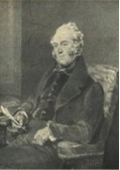 Walter Savage Landor was a controversial English writer of poetry and prose who often took to writing in Latin to attack or criticise his enemies. Mostly he got away with this ploy except when his barbs were aimed at those of equal academic status to himself who could, thus, read what was being written about them. He was a fiery character who found himself expelled from schools and rusticated from Oxford University for no less an offence than firing a gun at the windows of someone who kept late hours and disturbed his sleep! He wrote moving and often tender poetry, such as the well-known Rose Aylmer, and the pieces of prose called Imaginary Conversations received great critical acclaim.
Walter Savage Landor was a controversial English writer of poetry and prose who often took to writing in Latin to attack or criticise his enemies. Mostly he got away with this ploy except when his barbs were aimed at those of equal academic status to himself who could, thus, read what was being written about them. He was a fiery character who found himself expelled from schools and rusticated from Oxford University for no less an offence than firing a gun at the windows of someone who kept late hours and disturbed his sleep! He wrote moving and often tender poetry, such as the well-known Rose Aylmer, and the pieces of prose called Imaginary Conversations received great critical acclaim.
Landor was born in January 1775 in the English midlands town of Warwick. His home life was comfortable, the master of the house being the physician Dr Walter Landor. Both parents were independently wealthy with estates either owned or subject to future inheritance so the young Walter could look forward to a life of prosperity. Having successfully negotiated his first school, at Knowle, things took a downward turn at Rugby School. Walter was expelled for criticising his headmaster’s review of his work. He had to complete his schooling with private education but he won a place at Trinity College, Oxford where he was a rebellious character, known to sympathise with the Republican movement in France.
As mentioned above, his time at Oxford was cut short and, although he had the chance to go back later, he refused. Instead he set about his writing tasks with great gusto. As well as hundreds of poems and long pieces of prose, he wrote a lot of political essays for various publications, usually attacking the supporters of William Pitt. Contemporaries admired his skill, particularly his work in Latin, which was compared favourably to his work written in English. His lyrical poetry included tributes to a number of females who Lander saw as the ideal in womanhood; examples were Rose Aylmer, Ione, Ianthe and Rose Paynter and he also wrote sensitive verse about his own family members. Rose Aylmer is one of his most famous pieces and was written in tribute to a woman who he fell in love with, but lost, when she left her native Wales for India, dying shortly after of cholera. This short poem is reproduced here:

When aged only 20 Landor published a collection of poems written in English and Latin called The Poems of Walter Savage Landor. He also produced a satirical piece of work in pamphlet form which was a direct attack on Pitt’s suppression of liberal values and behaviour. This was probably the start of a career where he often seemed to be on the verge of prosecution for libel, or worse. He often found himself in trouble with the authorities, in England and abroad, but sometimes his misfortunes were not of his own doing. He was naturally headstrong and rebellious and he was often castigated by his own family.
Despite all of this though Landor was well-liked and seen as a kind and gentle man with a great number of loyal friends. His work often reflected this side of his nature. In 1798 he wrote Gebir, a romantic tale of a Spanish prince who falls in love with an Egyptian queen. This was compared, in some circles, to the work of Milton, Wordsworth and Coleridge.
The rest of his life was punctuated with adventure and more mishaps. In his 30s he decided to fight for the Spanish against Napoleon in the Peninsular War. He travelled Europe widely, through France to Italy and beyond. He lived in Italy for some years and moved in exalted circles at times. His Imaginary Conversations work was produced between 1824 and 1846 and he was still publishing work at the age of 81, but still getting himself into trouble for a variety of libellous attacks. He ended his days in Florence and, on one day in 1864, it is said that he announced to his landlady:

Walter Savage Landor died a few days later on the 17th September, 1864. He was 89 years old and was buried in the English cemetery in Florence.

